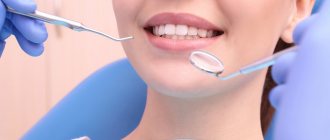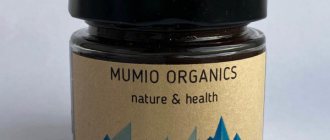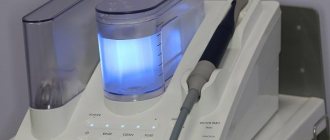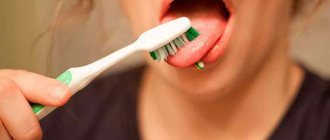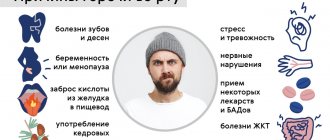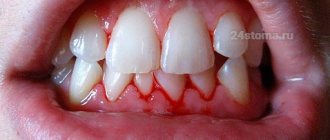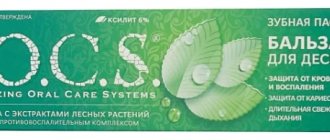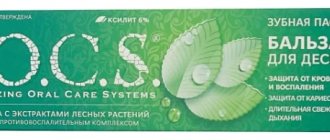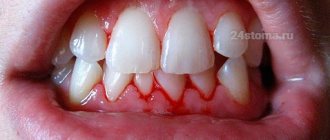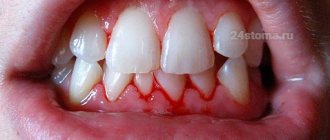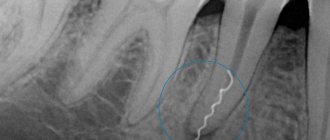Nutrition for periodontal disease should be healthy, varied and nutritious. With proper nutrition, the disease will not worsen, and acute periods will not recur, the gums will be healthy and strong.
Periodontal disease is a systemic disease of the periodontal tissues. The problem provokes bleeding, gradual resorption of bone tissue, the teeth become mobile and fall out over time. In order to prevent complete loss of teeth, it is necessary to modernly treat periodontal disease, and then follow the principles of proper nutrition.
Diet for periodontal disease
The main goal of a diet for periodontal disease is to saturate the body with vitamins and minerals that would help strengthen the gum tissue. The diet should include special foods:
- Solid food
It is solid foods that provide the so-called natural training of gums and teeth. But here you need to stick to the “golden mean”, that is, eat solid foods in moderation: apples, carrots, cucumbers, meat. You should avoid nuts and too hard grains.
But in case of acute periodontal disease, hard foods should be avoided, as they damage soft tissues and cause continuous bleeding of the gums. Include pureed foods and more liquid dishes in your diet.
- Dairy and fermented milk products
“Milk” is enriched with calcium, which is important for the formation of healthy gums and teeth. And fermented milk products activate the gastrointestinal tract, saturate the body with useful substances that are necessary for natural tissue regeneration. Kefir, fermented baked milk, yoghurts, cheese, cottage cheese, sour cream must be included in the daily diet. But you should avoid sugar; you can add a little honey instead.
- Citrus
They contain a large amount of vitamin C. Oranges, lemons, grapefruit, tangerines are welcome. Drink tea with lemon, which also has a tonic effect.
A diet for periodontal disease involves saturating the diet with fruits, vegetables, and dairy products. For protein, seafood, fish, and lean meats are recommended. Everything that is heavy and difficult for the body to digest should be excluded, including alcoholic and low-alcohol drinks.
Drinks recommended for periodontal disease:
- mineral water without gas (minimum 1.5 liters per day);
- weak green tea;
- compote of their fresh fruits or dried fruits;
- yoghurts;
- uzvar;
- jelly.
Application in dentistry
This product has a unique composition; it contains useful microelements and a number of essential vitamins. The medicine can be prescribed for various purposes, ranging from stomatitis to periodontal disease. Most often, propolis tincture is prescribed for the treatment of gums. The product is used for various purposes: in the presence of a violation of the integrity of the mucous membrane, during the inflammatory process and even purulent diseases. This drug is irreplaceable and has no analogues; doctors and patients value it for the following qualities:
- Effective for loose gums, strengthens the mucous membrane and gives it a characteristic shade.
- It has anti-inflammatory, antimicrobial and antifungal effects.
- Copes even with painful sensations.
- Accelerates the process of soft tissue regeneration.
Despite its natural composition and a wide range of benefits, propolis tincture can only be used after consultation with a doctor.
What vitamins should I take if I have periodontal disease?
To combat gum damage, it is necessary to saturate the body with vitamins. Here are the most important groups:
- Vitamin A - helps restore the epithelium, activates regeneration processes. A large amount of vitamin A is found in broccoli, carrots, pumpkin, blueberries, black currants, apricots, spinach, and liver.
- Vitamin E – is directly involved in the metabolic processes of the body. It is found in corn, vegetable oil, and rose hips.
- Vitamin K – takes part in blood clotting processes. Contained in spinach, parsley, cilantro, dill, cauliflower, green tomatoes. It is very important if it is necessary to prevent bleeding gums - a clear and first sign of periodontal disease.
- Vitamin B6 – helps strengthen blood vessels, improves mineral metabolism in the jaw bones. Contained in yeast, grains, legumes.
Along with healthy foods that contain vital vitamins, dentists recommend taking vitamin complexes - a ready-made set of useful components that will help prevent the development of periodontal disease and significantly improve health.
Gingivitis
This is the first and reversible stage of periodontitis. Gingivitis is inflammation of the gums. This disease is very dangerous during pregnancy - due to changes in the hormonal levels of the pregnant woman, the disease progresses faster than usual, can lead not only to the loss of teeth in the pregnant woman herself, but also cause dental problems in the future in the child, and even provoke premature birth.
If you notice the following signs, then most likely these are symptoms of developing gingivitis:
- gum inflammation, bleeding,
- bright red gum color,
- pain and swelling in the gum area,
- bad breath, quickly forming plaque and stones.
Minerals for periodontal disease
In addition to vitamins, gums and teeth need the following minerals:
- calcium;
- zinc;
- copper;
- iron;
- selenium.
Calcium is a “building element” for teeth and gums. Traditionally, calcium is found in milk, cheeses, yogurt, and sour cream.
Zinc takes part in the regenerative processes of bone tissue. Contained in legumes, beef, lentils, seafood.
Copper is necessary for healthy hematopoiesis, as well as the strengthening of iron in the body. High copper content is found in bread, potatoes, and liver. To ensure copper is absorbed better, it is recommended to include fermented milk products in your diet.
Iron helps enrich the body with oxygen. It is found in buckwheat, liver, beans, and beef.
Selenium is found in foods such as beans, peas, lentils, broccoli, barley, and nuts.
Causes of the disease
Gum periodontal disease is a systemic disease, which indicates that problems are not only in the oral cavity, but throughout the body as a whole. All periodontal tissues are involved in the inflammatory process. Most often, the disease has a chronic course and a tendency to rapidly progress.
Causes of periodontal disease:
- Gastrointestinal diseases.
- Atherosclerosis.
- Nervous system disorders.
- Diabetes.
- Avitaminosis.
- Pathologies of the cardiovascular system: atherosclerosis, hypertension, arrhythmia, tachycardia, angina.
- Endocrine disorders.
- Osteoporosis.
A local factor contributing to the development of the disease is an incorrectly formed bite.
Also, the etiology of the disease is a hereditary factor. However, this is only possible if the person is a carrier of monocyte-macrophages capable of producing active substances that dissolve bone tissue.
Not recommended products for periodontal disease
- sweets (sweets, chocolate, desserts, cakes, cookies) – it contributes to the destruction of hard and soft tissues of the oral cavity;
If you have periodontal disease, you should not eat viscous sweets (marshmallow, caramel, toffee), which stick to the tooth enamel, and the remains of such food are difficult to clean out with a brush. Such products provoke the formation of plaque and carious lesions.
- flour (buns, cookies, white bread) - these products are better replaced with bread, products made from wholemeal flour;
- fast food, soda, chips, crackers - foods that are poorly digested create problems in the gastrointestinal tract, which definitely affects the condition of the teeth;
- black tea and coffee - they negatively affect the condition of tooth enamel and soft tissues.
How to use for gum treatment
Pharmaceutical companies offer many modern drugs based on propolis. The most effective and cheapest is an alcohol tincture in a glass jar. It costs mere pennies, but the benefits of this medicine are invaluable. Let's take a closer look at how to use this tincture correctly:
- For gingivitis. If there is an inflammatory process, it is recommended to rinse daily. To prepare the product at the required concentration, take one glass of warm boiled water and add about 5 grams of propolis tincture. Mix thoroughly and rinse your gums at least 5-6 times a day. The course of treatment is at least a week.
- For periodontal disease and periodontitis. For these diseases, applications with tincture will be useful. Cut a sterile piece of bandage and thoroughly moisten it in the product (1 spoon of tincture per 1 glass of water). Apply the resulting compress to the gum and leave for 10 minutes. Do this at least three times a day.
- If there are wounds. For burns or other herbs to the mucous membrane, short-term baths are recommended. Prepare the medicine in the same proportion as above. Place the liquid in your mouth and try not to spit or swallow for at least 3 minutes.
Please note that the above recipes are not a guide to self-treatment. These measures are good only as additional measures; as independent therapy, their effectiveness is low.
How to treat periodontal disease with propolis
In folk medicine, there are many ways to use this remedy to treat inflammatory gum diseases:
- special lotions are applied to the surface of the affected area to relieve discomfort;
- for the purpose of disinfection, rinse the mouth;
- clean with special pastes;
- wipe inflamed areas with propolis;
- chewed like gum and specially left in the spaces between the teeth to kill all bacteria;
- They make ointments based on bee glue, which are also rubbed into the gums.
Bee glue treats inflammatory processes in the gums well, killing all bacteria in the oral cavity, stimulating the gum tissue and gradually restoring them. Preparations based on this product, decoctions, tinctures, mixtures, pastes and aerosols will become indispensable assistants in the fight against various types of ailments caused by bacteria, viruses or fungi.
What changes should you make to your diet?
It is important to strengthen bone tissue to eliminate periodontal disease. This is one of the goals of treatment. One of the main recommendations from experts concerns changing the menu. It is recommended to remove the following types of foods from your diet:
- chocolate;
- carbonated drinks;
- cookie;
- candies;
- waffles;
- gingerbread
The listed foods are rich in carbohydrates, which create an environment ideal for the proliferation of pathogens. It is recommended to enrich the menu with the following types of food:
- oily fish;
- boiled meat;
- cottage cheese, sour milk;
- fresh vegetables, fruits, berries;
- greens.
The foods listed above contain large amounts of proteins necessary for bone tissue restoration. You should also think about changing your toothbrush. Experts advise choosing products with soft bristles that are comfortable and do not cause discomfort. Such models do not cause mechanical injuries during use. When looking for a suitable toothpaste, it is better to give preference to products based on herbal ingredients.
Make an appointment by phone
Feedback
Treatment methods for periodontal disease
The development of the disease can be slowed down by treating periodontal disease with medications and carrying out the following procedures:
- professional hygiene for timely removal of dental plaque;
- splinting to normalize occlusal relationships;
- the use of drugs for periodontal disease, vitamins and agents to improve microcirculation in tissues (nicotinic acid, aloe extract, heparin);
- massage to strengthen gums during periodontal disease;
- grinding of teeth;
- prosthetics;
- darsonvalization of gums;
- filling erosions.
Modern methods
The most effective treatment for periodontal disease is based on the use of more modern methods, listed below:
- exposure to high pressure oxygen in hyperbaric chambers;
- ultrasonic device for the treatment of periodontal disease;
- local hypo- and hyperthermia;
- diadynamic currents;
- amplipulse therapy;
- electrophoresis;
- UHF therapy.
Which doctor treats periodontal disease? Most patients do not know the answer to this question. A doctor who treats periodontal disease is called a periodontist. Be sure to contact this specialist if you notice pale coloration and receding gums, increased tooth sensitivity, or a wedge-shaped defect. Where to treat periodontal disease? Of course, in a dental clinic.
